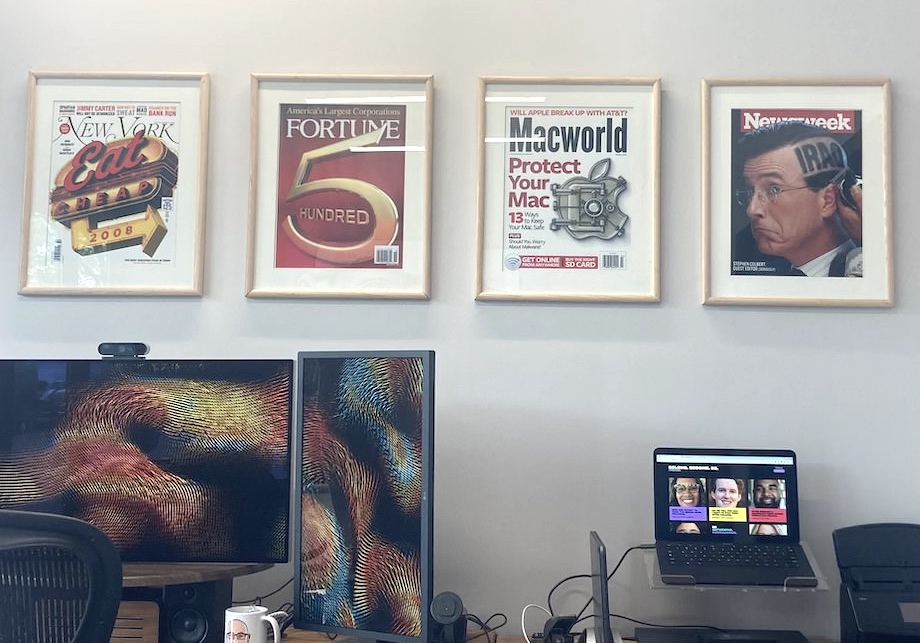When Joe Zeff was growing up, he dreamed of being the editor of the Pittsburgh Press. But the city’s newspaper industry shifted in the 1990s and the Press was absorbed into the Pittsburgh Post-Gazette, so he had to dream in a different direction. Zeff worked at the Pittsburgh Post-Gazette as a graphics director and built his career in print media by making digital illustrations at The New York Times, Time magazine and the Detroit Free Press.
Although his original plan to be a lifelong newspaperman didn’t pan out, Zeff told Technical.ly he’s still spent his life telling stories in different mediums. He even says he developed some of the earliest apps for iPads in the aughts.
The latest medium his company, Joe Zeff Design, is using is augmented reality.
According to Zeff, the technology is an interactive way for businesses and even cities to sell their best features to potential customers.

“What I love about augmented reality is that, unlike other media, there are no filters between the storyteller and the audience,” he told Technical.ly during a recent tour of his South Side office. “We’re able to create an experience that when a viewer scans a QR code, the storyteller appears directly in front of them to tell that story as their authentic self.”
Zeff believes this method of storytelling resonates with viewers better than a video or a flyer because it allows the viewer to see, for instance, a person in an almost hologram-like manner standing on a coffee table or desk in front of them and talk to them directly. You could see a patient from PeopleOne Health share their experiences when you scan a QR code, or you see a clip of Roberto Clemente playing baseball in his prime on a Pittsburgh Pirates’ flyer.
Joe Zeff Design began using augmented reality six years ago — he called AT&T his first client — and the founder feels the medium has a lot of potential. Zeff writes some code himself, but as the company’s lone employee, he relies on technology partners and contractors to deliver AR experiences to viewers’ mobile phones.
“I would not sit before you and say, ‘I invented augmented reality,’ but what I would say is I’ve pretty aggressively sought out ways to leverage this capability to tell stories in a more effective way,” Zeff said.

When he first started experimenting with the tech, Zeff recalled, he wanted to offer augmented reality to people in a way that didn’t rely on an app. The reasoning was that, he knew from firsthand experience that an app’s longevity can be heavily dependent on software updates; he didn’t want access to augmented reality to be dependent on whether an app was usable with the latest update. QR codes, he thought, have more staying power.

Through the years, Joe Zeff Design has brought augmented reality to a host of well-known national and local companies and brands for storytelling purposes. Among them are North Side space tech company Astrobotic, Nike, TMobile and the August Wilson Center. As a native Pittsburgher who has moved away and returned due to homesickness, lately he’s taken on the city as a whole as a client with his digital storytelling initiative, Augmented Pittsburgh.
“I was very disappointed when I told people that I was leaving the New York area to move to Pittsburgh, [and] there were a lot of people scratching their heads as to why would you want to go to Pittsburgh,” Zeff said. “And it’s been my experience since returning to Pittsburgh that there is so much happening here that the world knows too little about.”
One way that Zeff is telling Pittsburgh’s story is through a new marketing campaign with the Allegheny Conference on Community Development to promote the region. The campaign can be seen mostly in bus shelters and campuses; when you scan a QR code, Zeff said, you’ll see portraits of people who are passionate about Pittsburgh, with an invitation to go to a website and connect with them. (An Allegheny Conference spokesperson declined to comment on the campaign.)

After 30 years and a handful of cities, Zeff’s career looks different than how he imagined it would when he was starting out, but he’s happy that from magazine covers to album art, he’s managed to keep telling stories. Augmented reality is just the latest way he’s chosen to help people tell their stories.
“Augmented reality is the newest, freshest, most interesting way today to deliver these stories,” Zeff said. “It allows us to take what’s on the screen and what’s in your real world and combine them in really interesting ways.”








